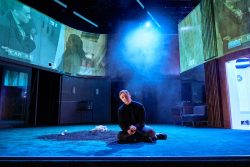 SHAKESPEARE’S Macbeth is having a moment this year, with several productions making their way onto the stage and directors competing with each other to discover contemporary relevance in this story of war, murder, greed, power and mental torment.
SHAKESPEARE’S Macbeth is having a moment this year, with several productions making their way onto the stage and directors competing with each other to discover contemporary relevance in this story of war, murder, greed, power and mental torment.
While David Tennant gives his Scottish king in London and Ralph Fiennes tours unusual venues around the country to bring his audiences into participatory battlefields, English Touring Theatre’s Richard Twyman has taken a timeless, gender-fluid and sometimes wordless look at the play, cutting and pasting the (GCSE set book) text and introducing some modern ideas.
Does it work?
I am a very old person, whose introduction to live theatre was a long time ago, when Shakespeare was regarded as unalterable and the theatre itself with a religious respect. Study of the “great plays” was serious, literal and proscriptive. It’s different now.
 The absolute cornerstone of the play is the relationship between Macbeth and his wife, the sexual elements of which, over many years, have been intensified and colourfully played out on stage. It is the story of the warrior Scottish Thane of Glamis, coming home victorious from battle and meeting three “witches” who prophesy his elevation to Thane of Cawdor (a much bigger estate) … and then to the throne. This makes him hungry for the top job, and, when he tells his wife, she’s all ready to kill the reigning king to make the prophecy come true – she’d kill her own child to get there, she says. Once the king is dead, the horror of the action, and the need to kill anyone else who might get in the way, becomes an obsession for the Macbeths, and eventually the haunted Lady M kills herself to get away from the visions of hell. Her husband is killed in a battle that follows another prophecy from the very prescient witches, but not before several other innocent women, children and soldiers have been violently despatched.
The absolute cornerstone of the play is the relationship between Macbeth and his wife, the sexual elements of which, over many years, have been intensified and colourfully played out on stage. It is the story of the warrior Scottish Thane of Glamis, coming home victorious from battle and meeting three “witches” who prophesy his elevation to Thane of Cawdor (a much bigger estate) … and then to the throne. This makes him hungry for the top job, and, when he tells his wife, she’s all ready to kill the reigning king to make the prophecy come true – she’d kill her own child to get there, she says. Once the king is dead, the horror of the action, and the need to kill anyone else who might get in the way, becomes an obsession for the Macbeths, and eventually the haunted Lady M kills herself to get away from the visions of hell. Her husband is killed in a battle that follows another prophecy from the very prescient witches, but not before several other innocent women, children and soldiers have been violently despatched.
Few members of a Macbeth audience don’t know the plot, which is reasonably well-explained here, but aspects of the production are confusing and inexplicable. It wasn’t helped on the press night by a temporary glitch in the technology, meaning that the poor piper (?) battled with video images as they buffered their way to stopping the action. That produced laughter at a most improbable moment, as did the invitation of members of the audience to join the banquet where Banquo’s ghost famously appears. It is not pantomime!
Only Macduff (a powerful performance by Guy Rhys) is kilted, and although the setting is Scotland – actually in the Macbeth’s home, a sort of modernistic 70s-ish extended chalet in the woods with lots of new tech – most of the cast have strong Geordie accents. Because Mike Noble (Macbeth) has a quiet voice, other than when he is roaring, audibility is a problem. He and his lady wife (Laura Elsworthy) sometimes look alarmingly like David and Sam Cameron.
 The production, touring since last September with three more venues to go, had to contend with a cast change two days before it opened in Bristol, but happily local actor Hanora Kamen was on hand to slip into the role of Lennox and again demonstrated her instinctive versatility.
The production, touring since last September with three more venues to go, had to contend with a cast change two days before it opened in Bristol, but happily local actor Hanora Kamen was on hand to slip into the role of Lennox and again demonstrated her instinctive versatility.
Leo Wan added a much-needed comedy moment as the porter, and continued as the Thane of Ross. Hayley Konadu’s Malcolm, daughter (?) of the murdered king Duncan (Ross Walton), is proclaimed king after an energetic proclamation that she can boogie, boogie woogie, all night long.
Next week my GCSE studying niece will be among the BOV audience. I’ll be interested to see what she thinks, and how this version will help students wanting to see their set books performed, as they were intended, on a stage.
GP-W
Photographs by The Other Richard